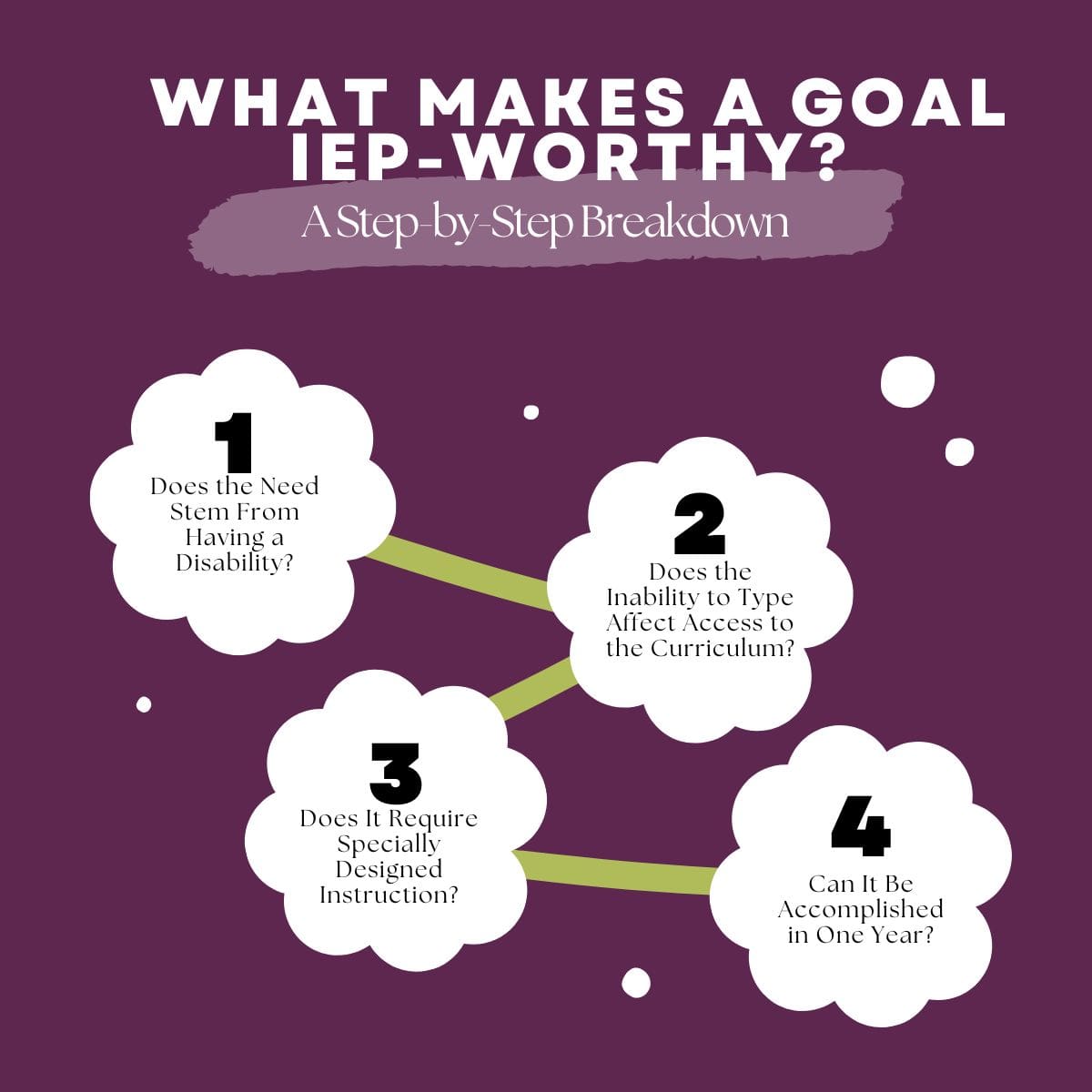Creating an IEP (Individualized Education Program) goal isn't just about identifying a student's needs; it's about determining which of those needs are truly IEP worthy. In this post, we'll dive into a case study about typing skills for a third grader and explore the four critical filters used to assess whether a goal deserves a place in an IEP. If you're a parent, educator, or advocate, this journey will help you better understand how to support students in reaching their full potential.
Is a Typing Goal IEP Worthy? A Deep Dive
In our case, the student is a third grader who currently types three words per minute with 73% accuracy. The goal is to improve this skill. Typing seems practical, right? But is it truly IEP worthy? Let's break it down using the four filters.
- Does the Need Stem From Having a Disability?
This filter is often the easiest to pass. The student in question has autism, which can impact motor skills and the ability to express ideas through writing. Typing can indeed be a valuable alternative form of communication. However, we must go deeper- does this student struggle with all motor tasks, not just typing? If so, typing is merely the activity through which we practice addressing a broader need, like motor planning or control. The goal should encompass more than just typing, and should aim for improved motor skills in general.
- Does the Inability to Type Affect Access to the Curriculum?
Typing can be a means for non-verbal students to express their thoughts and ideas. However, many students who can't type still access the curriculum through other means. So, the core question becomes: does this student need multiple modes of communication to engage effectively with the curriculum? If so, the goal might focus on “expressing ideas through various methods,” with typing as just one of those methods. This broader goal ensures the student isn't limited to one form of expression, thereby promoting inclusivity.
- Does It Require Specially Designed Instruction?
To justify an IEP goal, the student must need specially designed instruction. Typing practice, while valuable, may not require the unique instruction that an IEP provides. Instead, it might require accommodations, consultation with an occupational therapist (OT), or supplementary aids. Typing can be improved through support and practice without needing to become a formal IEP goal.
- Can It Be Accomplished in One Year?
An IEP goal should be achievable within a year. But without a comprehensive understanding of the student's present level of performance, it's challenging to set realistic benchmarks. If the goal is simply to “type faster and more accurately,” without clarity on the student's motor skills or other forms of expression, we risk setting a target that may not truly benefit the student in a meaningful timeframe.
The Final Verdict: Not IEP Worthy, But Still Valuable
In this case, the typing goal, while well-intentioned, isn't IEP worthy on its own. A more inclusive goal would focus on enabling the student to express themselves using multiple modes of communication. By shifting the focus from a narrow skill like typing to a broader objective like expressive communication, we create an environment where the student can thrive.
An IEP goal should address a student's core needs in a way that is specific, measurable, and achievable within a year, enhancing their ability to access and participate in the general curriculum. While typing is a valuable skill, the goal should focus on the broader need- effective communication. By doing so, we promote an inclusive educational environment that respects each student's unique abilities and needs.
Are you an educator or parent navigating the complexities of IEPs? Remember to look beyond the surface of a student's needs. Consider the broader skills and supports that will empower them to engage and succeed. Let's champion inclusive education together!
Resources
- About IDEA [U.S. Department of Education Website]
- Challenging, Ambitious, Measurable Annual Goals [IRIS Center module]
- Why SMART IEP Goals Might Not Be So Smart: 4 Essential Filters You Must Use! [Inclusive Schooling YouTube video: 3:20]
- Rethinking SMART Goals for IEPs: Ensuring Effective and Inclusive Education [Inclusive Schooling Blog]
- No Excuse to Exclude Checklist [free download]


